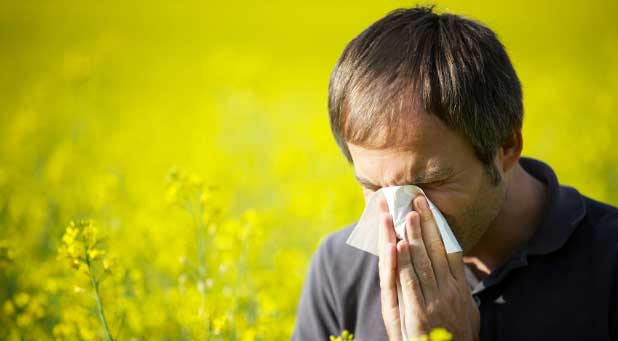Trees are budding. Spring is in the air. And so is pollen. Is it affecting you? Over 50 million Americans suffer from hay fever, making it the sixth most common chronic illness.
The root cause of your sniffles, sneezes, watery eyes, itchy nose, scratchy throat or draining sinuses may be a little-known factor.
Most allergic reactions are a sign of an imbalanced immune system. An overreactive or overly sensitive immune system can result in weakened adrenal glands. Allergic reactions involve the release of histamine and other pro-inflammatory substances.
Cortisol, released by the adrenal glands, is a primary anti-inflammatory agent. The amount of cortisol circulating in the blood is a key factor in controlling inflammatory reactions in the body. Cortisol is secreted as part of the anti-inflammatory response. It helps prevent reactions like keeping your eyes from swelling shut due to allergies. Healthy adrenal function plays an important role in histamine release and inflammatory reactions that cause allergic reactions.
When the adrenals are fatigued, they are less likely to produce enough cortisol to adequately counteract inflammatory reactions. Allergy symptoms can flare up and make us miserable.
Have you noticed that when you are more stressed, your allergic reactions are worse? People going through times of adrenal fatigue often experience worse symptoms. When more histamine is released, it takes additional cortisol to control the inflammatory response. This pushes the adrenal glands harder then ever. The more they have to work, the more fatigued they can become, and the less cortisol they produce. Elevated histamine levels inflame the tissues even more. A destructive cycle is set in motion that can lead to deepening adrenal fatigue and more severe allergic reactions.
To break this cycle, it is imperative to give your adrenal glands the support they need. This is far better than simply manipulating your body with antihistamines. Supporting your immune system and adrenal glands helps you get to the root of the problem.
What you can do right away:
- Juice lots of vegetables and include plenty of ginger root—it’s an anti-inflammatory agent
- Don’t drink coffee or anything else with caffeine—this whips tired adrenals, forcing them to work when they need to rest
- Get plenty of sleep—seven to nine hours a night
- Eat adequate protein
- Take extra vitamin C with bioflavonoids
- Take adrenal support supplements
- Reduce stress—take a break, decompress, schedule times to relax, meditate, pray
If you’ve been struggling with allergies, keep in mind that you may need to address your adrenal gland health. You may also need to identify foods your body is sensitive to, such as wheat (gluten), dairy, corn, soy or sweets. When your body is sensitive to certain foods you eat, you will also react more intensely to pollens and grasses. And make sure you de-stress your life as much as possible. You may be quite encouraged with the improvements you see in your health.
Cherie Calbom, M.S., C.N., is the author of 24 books, including The Juice Lady’s Remedies for Allergies and Asthma, The Juice Lady’s Remedies for Stress and Adrenal Fatigue, The Juice Lady’s Big Book of Juices and Green Smoothies and Juicing, Fasting and Detoxing for Life. She has devoted her life to teaching people how to care for their bodies so they might complete their destiny. For more information, visit her at juiceladycherie.com.











































